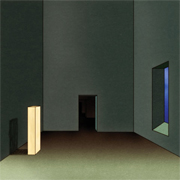Media are containers for other media. And in the 21st century, cultural productions of all stripes have themselves started acting more like media in this way: they have become containers for precedent cultural artefacts. Daniel Lopatin’s work as Oneohtrix Point Never is a shining example of this phenomenon. His albums are time capsules of the hyper-immediate present, albeit ones predominantly stocked with a carefully curated past – until now. Lopatin’s rash of recordings in recent years betrayed an affinity for dead forms and formats: CDRs, analogue synths, a predilection for kosmische. With an ironic wink, his ‘echo jams’ posted to YouTube chopped-and-screwed isolated loops of Chris de Burgh and Rush. The cover art for 2011’s Replica depicted a skeletal skull reflected back in a handheld mirror. R Plus Seven, on the other hand, showcases an artist seemingly obsessed with the future, or at least what possible futures might have looked like to a teenaged utopian in 1993.
Aesthetically, Lopatin’s palette for R Plus Seven consists of familiar tropes: its 10 tracks are full of brash and staccato timbres, constructed upon repetitive, nonsensical, and dislocated samples, as if fast-forwarded through. He appears curiously preoccupied by reinventing only the most piercing of preset instruments. There are liberal helpings of dyspeptic cheesiness, and his MIDI-patch choirs put the ‘phony’ back in polyphony.
But unlike Lopatin’s preceding releases, a complex compositional strategy is afoot here. There is almost no formless wandering, and the album feels far more like a carefully constructed and well-paced narrative than a slapdash assembly of half-baked ideas. It’s game-esque in structure – what you might imagine 3D printed music to sound like. You might well question whether or not Lopatin’s highly stylised aesthetic, or his fastidious organisation of sounds on this particular record, is to your liking. But placing value and passing judgement are two different matters. In some ways it feels like an almost entirely academic, cerebral exercise. Read this album more like a text than listen to it as music.
Still, its most effective moments are also its most affecting, where a delicate balance is struck between mechanical and emotive. And while Lopatin’s melodies are almost always anchored by an optimistic and distinctly American prettiness (think Aaron Copland meets the soundtrack for an after school special teaching moment), there is an unmistakable strategy of pleasure denial at work here. It’s there in the way that ‘Zebra’ almost breaks into a house anthem, and present again in the 24 bars when ‘Still Life’ becomes a swirling trap rhapsody, only to dissolve as quickly as it formed.
R Plus Seven represents a real push by Lopatin to more deliberately treat music making under his Oneohtrix Point Never aegis as art practice as well as profession. His move to Warp Records hints at this vocational resolve, being an imprint that’s known to groom artists for their longevity. And the fact remains that art is just as much labour – just as much a career – as any.
It used to be that releasing a record through a well-established label meant conforming to a kind of house style, or ceding degrees of risk-taking, in the same way that I imagine becoming a partner at a big law firm would spell the end of bleeding heart pro bono personal projects. But that trend seems to be reversing, allowing people like Lopatin to confidently deliver bolder, more fully articulated work with the cultural weight of a respected brand engine at his back. And this first release for Warp does demand to be taken seriously.
R Plus Seven marks not only an important milestone for Oneohtrix Point Never, but also for the broader historical continuum of electronic music. It’s a ‘where are we now?’ kind of album; at its finest, it aspires to speak to the state-of-the-art. The digitally manipulated images in Takeshi Murata’s promo clip for ‘Problem Areas’ – of chromed fruit, a Dilbert mug at its tipping point, hopelessly tangled iPod headphones – paint a striking picture of capitalist surrealism: a world in which every object is simultaneously overproduced and rendered useless. The album performs the rare double function, then, of both a container of culture, and a commentary upon it.
But people will say what they will. Over a relatively short time span, the internet has opened a whole can of new channels for the circulation and reception of music and, more than most, Lopatin’s work has been at the centre of endless online discussion, speculation, and criticism. Ironically, a rather niche project like Oneohtrix Point Never arguably couldn’t have found the audience it did prior to those new channels. An obvious talking point is that Lopatin makes easy work that relies heavily upon the facility afforded through technology – ultimately, and unlike the beatific, reflexive drift of his earlier work, R Plus Seven is music that’s more programmed than performed. But behind that programming is a very human kind of agency, pushing the right buttons. Amidst an excess of prosumers, Lopatin proves here to be an actual pro.


